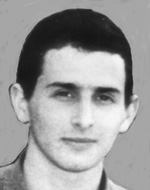Jonathan (Yoni) Barnea was born on July 16, 1976, in Washington, DC, in the United States. Yoni is the eldest son of Tamara (Tami) and Nahum, brother of Shlomit and Uri. When he was one year old, his father completed his journalistic mission in the United States. The family returned to Israel and settled in Jerusalem. Yoni attended the “Olam HaYeled” kindergarten in the Old Katamon neighborhood, where he moved to the Henrietta Szold elementary school and later to the Beit Chinuch high school where he graduated in 1994. In the fifth grade, Yoni joined his friends in the “Modi’in” tribe of the Jerusalem Scouts. He was a student, a counselor, and a commander of the “Modiin” tribe, a central place in his life, and he loved children very much, and he loved his pupils. The religious observant community Masuot, whose friendship with the religious viewers engendered joint activities designed to promote tolerance and mutual understanding between religious and secular youth, was gifted with humanistic subjects in high school and had a tendency to write for a few years, He also corresponded with his friends, and his letters were filled with humor and warmth Arabic language and decided to choose it as a favorite subject, he completed five units in Arabic, and was interested in the politics of the Arab-Israeli conflict and read literature and the press on these subjects, and he believed in peace. Goodwill from all over the world, from South Africa to Eastern Europe, from the war in apartheid to the protection of the environment, he joined the human rights organization Amnesty International and the environmental organization Greenpeace in high school, and served in the intelligence corps as a natural continuation of his school interests. He volunteered for a pre-military intelligence course. In March 1995 he enlisted after five months of training, and in March 1996 he was supposed to begin training at the IAF training base. According to his commanders, Yoni was very curious about his tendency to “think big,” to look at things from a different angle, to criticize, and to suggest solutions. In his professional work he displayed a high level of responsibility and meticulous attention to every detail, and yet he was able to combine the hard work of the youth movement with the hard work of intelligence and in the tough military framework. His friends told the service that he was able to relieve the heavy boredom in night shifts. He knew how to influence his fellow members of the unit with attention, listening and warmth. Yoni was interested in photography and spent the past year wandering with his camera in the Old City, the ultra-Orthodox neighborhoods and other sites. The last film he took, which was developed only after his death, included photographs from the farewell party he gave to his friends at the base on the eve of his departure for instruction, as well as photographs from Rabin Square in Tel Aviv. Rabin’s murder shocked him deeply. On the day of the attack in Kfar Darom on April 9, 1995, he wrote to his girlfriend: “I know that I am supposed to be sad and to share the sorrow of the families and everything, but I am sad only as much as I have to, Or imagine my family hearing about my death in a terrorist attack: “I do not understand to the end what is going on in this world, what logic makes things happen. I do not want to philosophize too much – but why does one person get up in the morning alive, after living twenty years, being educated, patting, being influenced, getting on a bus and dying? “How can a mother break up with the daughter who goes to the army in the morning and at noon to arrange a funeral for her, and how do you suddenly realize that someone will not come back, someone who was not planning to die that week?” And how, a few hundred meters away,A completely different sea, with completely different beliefs, with a completely opposite life – anyone ready to kill for his only truth? “Is there a single truth?” On Sunday, February 25, 1996, on June 25, 1996, Yoni boarded bus No. 18 on Emek Refaim Street in Jerusalem, near his home, on his way to the central bus station, from where he intended to proceed to the base. He was buried at the military cemetery on Mount Herzl and was immortalized in the “Yochat Yoni”, a building that was built for him in the “Scouts” tribe in the Valley of the Cross in Jerusalem. His friends in the unit.
